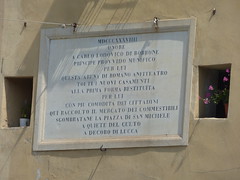Carlo Lodovico di Borbone


Carlo Lodovico di Borbone
(1799-1883)
King of Etruria (1803-1807), Duke of Lucca (1824-1847), and Duke of Parma (1847-1849)
Commemorated on 1 plaque
MDCCCXXXVIIII Onore A Carlo Lodovico di Borbone Principe Provvido Munifico Per Lui Questa Arena di Romano Anfiteatro Tolti I nuovi Casamenti Alla prima forma restituita Per lui Con piu comodita dei Cittadini Qui raccolto il mercato dei commestibili Sgombratane la Piazza di San Michele A quiete del culto A decoro di Lucca
English translation: 1839 Honour To Carlo Lodovico di Borbone Principe Provide Munific For Him This Arena of Roman Amphitheatre Removed The new Casamenti The first form returned For him With more comfort of the Citizens Here collected the market of edible Sgombratane the Piazza di San Michele A quiet cult A decorum of Lucca
Piazza Anfiteatro, Lucca, Italy where they was honoured (1839)

